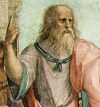- Menexenus (dialogue)
-

Part of the series on:
The Dialogues of PlatoEarly dialogues: Apology – Charmides – Crito Euthyphro – First Alcibiades Hippias Major – Hippias Minor Ion – Laches – Lysis Transitional & middle dialogues: Cratylus – Euthydemus – Gorgias Menexenus – Meno – Phaedo Protagoras – Symposium Later middle dialogues: Republic – Phaedrus Parmenides – Theaetetus Late dialogues: Clitophon – Timaeus – Critias Sophist – Statesman Philebus – Laws Of doubtful authenticity: Axiochus – Demodocus Epinomis – Epistles – Eryxias Halcyon – Hipparchus – Minos On Justice – On Virtue Rival Lovers – Second Alcibiades Sisyphus – Theages 
Part of a series on Plato Early life · Works · Platonism
Epistemology · Idealism / Realism
Theory of Forms
Form of the Good
Third man argument
Euthyphro dilemma · Five regimes
Philosopher kingAllegories and metaphors Ring of Gyges · The cave
The divided line · The sun
Ship of state · Myth of Er
The chariotRelated articles The Academy in Athens
Socratic problem
Commentaries on Plato
Middle Platonism · Neoplatonism
Neoplatonism and ChristianityThe Menexenus (Greek: Μενέξενоς) is a Socratic dialogue of Plato, traditionally included in the seventh tetralogy along with the Greater and Lesser Hippias and the Ion. The characters are Socrates and Menexenus, who is not to be confused with Socrates' son Menexenus. The Menexenus of Plato's dialogue appears also in his Lysis and the Phaedo. In the Lysis, he is identified as the "son of Demophon" (207b).
The Menexenus consists mainly of a lengthy funeral oration, satirizing the one given by Pericles in Thucydides' account of the Peloponnesian War. In this way the Menexenus is unique among the Platonic dialogues, in that the actual 'dialogue' serves primarily as exposition for the oration. For this reason, perhaps, the Menexenus has come under some suspicion of illegitimacy.
Perhaps the most interest in the Menexenus stems from the fact that it is one of the few extant sources on the practice of Athenian funeral oratory, even though it is a parody thereof.
Translations
- Plato, Appendix, Introduction, & English translation by Benjamin Jowett (~1892), – Project Gutenberg EBook (English) — Same
 Menexenus. Wikisource.
Menexenus. Wikisource. - Plato, Annotated English translation by Walter Rangeley Maitland Lamb, Plato in Twelve Volumes, Vol. 9 (1925), Cambridge, MA, Harvard University Press; London, William Heinemann Ltd., – Perseus Digital Library, Tufts University (English)
- Plato, Audio Book(s) - English translation by Benjamin Jowett, – Internet Archive, Community Audio, mp3 (64kp/128kp/Ogg Vorbis) (English)
- Plato, Ancient Greek, – Poesia latina, Greco interattivo (Ancient Greek)
- Schofield, Malcolm (edt); translations by Tom Griffith (2009) (in English). Plato: Gorgias, Menexenus, Protagoras (Cambridge Texts in the History of Political Thought). Cambridge University Press. pp. 264. ISBN 9780521837293.
Further reading
- Collins, Susan D.; Stauffer, Devin (1999). "The Challenge of Plato's 'Menexenus'". The Review of Politics 61 (1): 85–115. doi:10.1017/S003467050002814X.
- Coventry, Lucinda (1989). "Philosophy and Rhetoric in the Menexenus". Journal of Hellenic Studies (The Society for the Promotion of Hellenic Studies) 109: 1–15. doi:10.2307/632028. JSTOR 632028.
- Kahn, Charles H. (1963). "Plato's Funeral Oration: The Motive of the Menexenus". Classical Philology 58 (4): 220–234. doi:10.1086/364821.
- Monoson, S. Sara (1998). "Remembering Pericles: The Political and Theoretical Import of Plato's Menexenus". Political Theory 26 (4): 489–513. doi:10.1177/0090591798026004003.
- Rosenstock, Bruce (1994). "Socrates as Revenant: A Reading of the Menexenus". Phoenix (Classical Association of Canada) 48 (4): 331–347. doi:10.2307/1192572. JSTOR 1192572.
Categories:- Articles with Ancient Greek language external links
- Dialogues of Plato
- Socratic dialogues
- Funeral orations
- Plato, Appendix, Introduction, & English translation by Benjamin Jowett (~1892), – Project Gutenberg EBook (English) — Same
Wikimedia Foundation. 2010.
